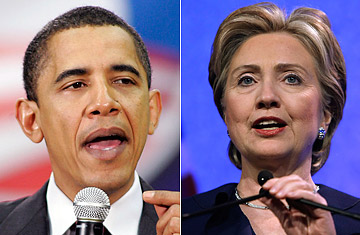
After several brutal days of trying to defend himself against accusations of being an "out-of-touch elitist", Barack Obama faces a major overriding challenge in tonight's nationally televised debate with Hillary Clinton at Philadelphia's National Constitution Center — to prove that is a regular guy. Even under the best of circumstances that's not an easy task when you're standing on a stage before a packed auditorium of hundreds and being broadcast to millions. But considering the fallout he has had to endure since his notorious "bitter" comments about small-town America were revealed, and the fact that Obama has already had a hard time connecting with blue-collar voters during much of the campaign, it's an especially tall order.
"It's not surprising that they get bitter," Obama told a group of wealthy Californian donors at a closed San Francisco fund raiser, referring to rural blue-collar workers who have been hard hit by outsourcing and declining wages. "They cling to guns or religion or antipathy to people who aren't like them or anti-immigrant sentiment or anti-trade sentiment as a way to explain their frustrations."
Obama has since apologized if he offended anyone and has tried to put the remarks in context, saying it shouldn't be surprising that a lot of people are angry given the government's failure to improve their lot. But his efforts to explain the nuances of his meaning have largely been lost amidst an all-out assault by the Clinton campaign, and with just six days left before the all important Pennsylvania primary next Tuesday, the gaffe came at a particularly bad time. He had been gaining in Keystone State polls, coming within 6 percentage points of Clinton last week before the flap from more than 20 points behind. His momentum has slowed and he's since slipped a percentage point, according to an average of Pennsylvania polls by by the non-partisan website Real Clear Politics.
Obama has spent the last month courting Pennsylvania's blue-collar workers to mixed results. His six-day bus tour across the state, meant to showcase his approachability, was a series of awkward photo-ops. And another soaring speech, like the one he delivered in Philadelphia last month to address the race issue, might only underline an intellectual prowess that some perceive as elitist.
For a candidate who has been so widely praised for his eloquence and stirring speeches, it's a bit puzzling to see how Obama has found himself in the current mess. But in some respects, he is a victim of his own success. To a great degree his campaign has been built on the notion that it is a break from politics-as-usual, including a surprising amount of candor (and sometimes naivete) that in this instance has come back to bite him.
In what may well be a preview of the approach he takes in the debate, Obama responded to the elitist charge at a town hall for veterans earlier this week by turning the accusation around. "I am amused by this notion of elitist given that — when you are raised by single mom, when you are on food stamps for a while when you're growing up, you went to school on scholarship," Obama said "So when someone makes that argument, particularly when I've spent my entire life working with workers in low-income communities to try to make peoples lives a little bit better, that's when you know we're in the political silly season."
Indeed, the irony is that while Obama may have never been your average Joe, until joining the Senate just three years ago he was something pretty close to it: driving his own cars, answering his own phone, cooking his famous chili for friends and still paying off his student loans. By contrast, Hillary Clinton has been in Washington for more than a decade and John McCain, who has also thrown a few elitist jabs Obama's way, has been there more than two decades.
But unfortunately for Obama, it's a dangerous perception. "Mistakes become "gaffes" when they play to an underlying stereotype," said Michael Munger, a political science professor at Duke University. "The Obama stereotype is a wealthy Ivy League elitist. He's a little too well-spoken; his suits are a little too expensive. From him, the comment comes off as condescending."
And his campaign's attempts to change his image over the past month have been largely self-defeating. Since Obama's double-digit loss in Ohio —where he lost the white male non-college-educated vote to Clinton 66% to 31% — his campaign has been trotting him through a series of extracurricular activities like bowling, shopping and grabbing beers at a bar. But rather than make him look more like a regular guy, they have looked strained — a regular guy struggling to be a politician playing the role of a regular guy for a photo-op.
One case in point: the day after his unfortunate bowling excursion (where he scored a measly 47) Obama visited an agricultural facility in State College. In some campaign staffer's imagination the scene of the candidate in shirtsleeves feeding a bottle to a baby cow was a good way to present Obama-the-everyman. But with the media decked out in little blue protective booties, and Obama self-consciously patting the animal, the scene was uncomfortable for everybody but the calf.
Still, at the end of it, Obama showed what all the campaign's stage-managing has failed to — marveling, "Wow, she really housed that sucker." The offhand outburst of slang made him seem like anything but an intellectual, or a presidential candidate. Whether he can capably channel more of that guy-next-door-persona tonight could well determine his fate in Pennsylvania, and possibly in the fall.
